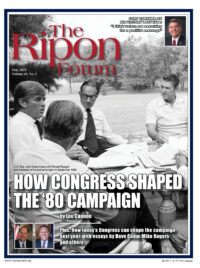
The current Congress is less than a year old, and already it is clear that the new GOP majority will have a tough time passing its agenda, let alone overcoming presidential vetoes to any laws that should happen to pass. Such an unfortunate circumstance does not, however, mean that this Congress cannot have an impact. Even without the ability to pass ambitious new laws, the GOP Congress has a real opportunity to shape the agenda heading into the 2016 election and beyond.
Lou Cannon has shown elsewhere in this edition of The Ripon Forum how Congress helped shape the 1980 campaign. This Congress can do something similar by establishing a governing agenda. Such an agenda would have to include three main components: responsible budgeting, health care improvements, and a suite of high-tech proposals to get our economy moving.
On the budget front, our national debt of $18 trillion is inexcusable. While the annual deficit has decreased in recent years – thanks in large part to a GOP House reining in President Obama’s spending excesses – the debt itself is continuing to grow. When you add in long term unfunded entitlement liabilities, the situation is even more worrisome. The GOP can and should use its control of both Houses to pass responsible budgets that establish some kind of glide path towards long term debt reduction and entitlement reform. The biggest and boldest steps in this regard must be taken by a willing president, but a GOP Congress can provide an important signal that there is congressional support to take on these tough problems.
The GOP can begin to show how it would deal with the consistently unpopular ACA by proposing targeted reforms to some of the ACA’s worst and most unpopular provisions.
On the health front, President Obama is too committed to his Affordable Care Act to sign any significant and worthwhile changes while he remains in office. The GOP, however, can begin to show how it would deal with the consistently unpopular ACA by proposing targeted reforms to some of the ACA’s worst and most unpopular provisions. One place to start is with the Medical Device tax, an unnecessary tax that discourages one of our most innovative industries. There is already bipartisan opposition to this tax, even coming from liberal Senators such as Al Franken, Amy Klobuchar, and Elizabeth Warren (it is no coincidence that these Senators represent states with robust medical device industries). The bipartisan opposition to the tax provides a real opportunity to get a repeal to President Obama’s desk. The likelihood remains that he would veto it, but such a veto would allow 2016 presidential candidates to tout the fact that they would sign such a provision should they have the opportunity to do so.
A similarly unpopular provision is the high cost health plan excise tax, also known as the Cadillac Tax. Like the Alternative Minimum Tax, this tax, which was sold as one targeted to just high cost plans, will increasingly be hitting millions of middle class taxpayers in the years ahead. By the year 2031, for example, the Cadillac tax will be hitting the average value family health plan. As with the device tax, there is also bipartisan support for getting rid of this tax. Unions dislike the tax as it affects hard fought benefit gains, and state and local officials dislike the fact that it applies to their employees as well. Once again, getting such a bill to President Obama’s desk, even if he vetoes it, gives the new president another bipartisan item to sign into law shortly after taking the oath of office.
By taking these steps, the GOP Congress can show that it has a hand in shaping the 2016 agenda rather than reacting to it.
These actions can have another advantage as well. The GOP has been bleeding young and highly educated voters in recent elections. Part of the reason for the poor showing has been the lack of a positive agenda to appeal to tech-savvy voters, such as scientists, hi-tech workers, doctors, and even some professors (mainly those in the hard sciences.) A responsible budget and a pro-innovation tax cut such as the device tax repeal can have some appeal among these voters who think that the standard GOP agenda has little to offer them. These voters want to hear that the GOP has a plan for revitalizing our economy and taking advantage of America’s comparative advantage in the area of technology. Other components of such an agenda could include supporting free trade and improving our K-12 education system by having dollars follow children, rather than trapping poor kids in non-performing schools.
By taking these steps, the GOP Congress can show that it has a hand in shaping the 2016 agenda rather than reacting to it. If these reforms become law, they will make things better and easier for both the next president and for the American people. If, however, they are stopped by President Obama’s veto pen, they can still have an impact by shaping the contours of the 2016 race.
Tevi Troy is President of the American Health Policy Institute and a former Deputy Secretary of Health and Senior White House aide.




